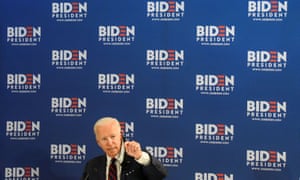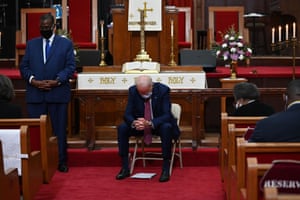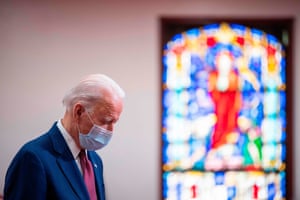‘Who are we?’ Joe Biden seizes the moment as nation’s attitude shifts on race
Democratic candidate appears emboldened by the changed political landscape, embracing a far more ambitious reform agenda than he did when entered the race for president

Photograph: Bastiaan Slabbers/Reuters
In the weeks since George Floyd died under the knee of a white police officer America’s institutions – from boardrooms and newsrooms to locker rooms and classrooms – are publicly addressing systematic discrimination and demanding reforms.
With a reckoning over race compounded by a pandemic and an economic collapse, Donald Trump and his would-be Democratic opponent Joe Biden are charting starkly different courses for the nation that could determine which one of them wins the White House in November.
But in tone, tenor and leadership style, it is Biden who currently appears well positioned to harness this political moment.
Biden has sought to cast himself as a champion of racial equality, encouraging peaceful protest and vowing to “heal the racial wounds that have long plagued our country”.
“This is a battle for the soul of America,” he said at an economic roundtable in Philadelphia last week. “Who are we? What do we want to be? How do we see ourselves? What do we think we should be? Character is on the ballot here.”
As public attitudes shift quickly on race, Biden appears emboldened by the changed political landscape, embracing a far more ambitious reform agenda than he entered the race for president. By contrast, Trump, with his hostility to the protesters and resistance to their demands for reform, has found himself on the wrong side of the American public at a particularly perilous moment for his presidency and his re-election prospects.
A Washington Post-Schar School poll found that 61% of Americans disapprove of the way Trump handled the protests while just 35% approve. When asked what type of president they preferred at this moment of racial strife, half said they would prefer a leader who can “address the nation’s racial divisions”, compared with 37% who said they would prefer a leader who can “restore security by enforcing the law”.

“People are finally seeing through the fog that has blinded them for too long,” said Antjuan Seawright, a Democratic strategist based in South Carolina. “They are realizing that the system is broken and Donald Trump is not going to fix it.”
Public opinion on race has been moving leftward since the Black Lives Matter movement emerged in the wake of Trayvon Martin’s death in 2012. White Democrats in particular have become increasingly more concerned about issues of racial inequality, even registering to the left of African Americans voters.
But the recent shifts represent a sea change so sudden and deep that pollsters were left grasping for parallels.
A Monmouth poll conducted after Floyd’s killing found that for the first time a majority of Americans – 57% – and 49% of white Americans believe police are more likely to use excessive force against African Americans.
When Eric Garner was killed by a police officer in New York City in 2014, just 33% of Americans and 26% of white Americans say African Americans were more likely to be subject to excessive use of force by the police. The same poll found that 3 in 4 Americans consider racism and discrimination a “big problem”.
Support for Black Lives Matter has also jumped, according to Civiqs Polling, that found voters from across the ideological and demographic spectrum embrace the movement.
“This is big,” tweeted Frank Luntz, a Republican pollster who said he hadn’t seen anything like it in more than three decades of polling. “This is ‘Beatles on Ed Sullivan’ big.”
Ample research has found race and identity were critical to Trump’s victory in 2016.
During the campaign, he brazenly stoked white racial grievance that had been building since the election of the nation’s first black president, promising to restore America’s past glory and “Make America Great Again”.
As president, Trump said there were “good people on both sides” of a deadly white supremacist rally. He disparaged four congresswomen of color with a racist taunt. And recently, he has responded to the most significant racial upheaval in a generation by describing protesters as “thugs” and “terrorists”, threatening to unleash the army to quell demonstrations and defending military bases named after Confederate leaders.
In response to the protests, Trump has declared himself the “president of law and order”, appealing to a base that is predominantly white and conservative. This week he held a roundtable with law enforcement officials in Dallas, where he dismissed police brutality as the misconduct of a few “bad apples” and warned that “falsely labeling tens of millions of decent Americans as racists or bigots” would not improve race relations.

Some observers have compared Trumps approach to Richard Nixon’s 1968 election strategy, when he ran as the law-and-order candidate after a summer of riots – and won.
But there is reason to believe 2020 may be different from 2016 and 1968, said Michael Tesler, a political scientist at the University of California at Irvine and author of Post-Racial or Most Racial? Race and Politics in the Obama Era.
While “law and order” can be a powerful message in the midst of national upheaval, Tesler said, it’s a much harder case to make as an incumbent whose governing style over the last three and a half years has contributed to that chaos.
“The country views Trump as a racial arsonist at a time when racial reconciliation is needed,” he wrote in an email.
And far from boosting Trump in November, the protests are likely to mobilize and energize Democrats, says Daniel Gillion, a political science professor at the University of Pennsylvania and author of The Loud Minority: Why Protests Matter in American Democracy.
Throughout modern American history, protests have not only succeeded in influencing public policy but impacted electoral outcomes for the party ideologically aligned with their cause, according to Gillion.
His research found African American turnout in 2016 was higher in cities that saw Black Lives Matter protests, even as it declined elsewhere. But the effect is geographically concentrated and the protests were limited.
“Now that protests are happening in everyone’s backyard it’s likely there will be a snowballing effect,” he said. “And based on what I’ve found, one can only expect that Democrats are going to be more mobilized to vote in November because of what’s taking place.”
Heather McGhee, co-chair of the political advocacy group color of change, said the coronavirus pandemic and the economic crisis caused by efforts to control it, which have disproportionately impacted African American communities, “primed” the nation for this tectonic shift in attitudes on racism in America.
“It became very clear once the pandemic is that we were all suffering from the same storm, but we weren’t all in the same boat,” said McGhee.
McGhee described Biden as a “weather vane” for the Democratic party.
During the primary, he offered himself as a pragmatist who once assured donors that under his administration “nothing would fundamentally change”. But that was when Democrats’ top concern was ousting Trump. Now, as inequalities in public health, the economy and race are laid bare, Biden’s sudden desire for systemic change is telling.
“The band-aid has been ripped off,” Biden said recently during a virtual appearance, explaining that more Americans are connecting the dots and exposed deep-rooted social ills. “The scar is apparent and I think they’re ready to do something about it. I think they’re ready to see some real institutional change.”

A majority of Americans, including among Republicans, agree some changes to policing are needed. But growing calls from activists to “defund the police” has little support.
“There is a danger that lurks there for Biden and the Democrats,” warned Ruy Teixeira, a political demographer at the Center for American Progress, a liberal thinktank in Washington. “There are scenarios in which you could see Trump making a successful law and order appeal, particularly to these white non-college [educated] voters who are sensitive to the issue.”
Biden, who faced criticism during the primary over his legislative record on criminal justice and race, has embraced an overhaul of policing.
Though he and Democratic leaders in Congress have flatly rejected growing calls to “defund the police” it has not stopped Trump and his Republican allies from seizing on the issue in an effort to drive a wedge between activists and moderate Democrats.
Trump’s electoral strategy hinges on his ability to drive up turnout among his base of support, which is predominantly white, older, less educated and conservative. While their share of the electorate is shrinking, this cohort holds outsized influence in the handful of states that will likely determine the election.
Biden’s task is to stitch together a coalition that is increasingly multicultural, young, educated and liberal. Diverse battleground states like Arizona, Georgia and Texas, once bastions of conservatism, are now competitive.
Biden won the primary on the strength of his support among African Americans, but he struggled to appeal to the young voters now leading the protests, said Steve Phillips, host of Democracy in Color with Steve Phillips and the author of the book Brown Is the New White.
“There’s a bigger risk of failing to inspire and galvanize younger voters and people of color than there is alienating moderate voters,” he said.
Karen Finney, a Democratic strategist who advised Hillary Clinton’s campaign in 2016, said Biden must “treat black voters like swing voters”.
Choosing a black woman as his running mate would be one way of emphasizing black voters importance to the Democratic party.
“History is telling us that in this moment we need to lift the voices of black Americans,” she said, “and especially the voices of black women”.



